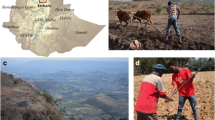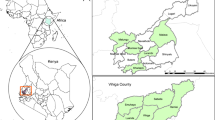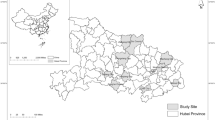Abstract
In response to global climate change, the Chinese Government has taken numerous measures to promote low-carbon management practices, but the overall adoption rate has been lower than expected. Empirical studies on the path dependence of farming experience, that is, long-standing planting concepts that will hinder farmers from adopting new technologies, have not been reported. Hence, to fill the research gaps, this paper uses survey data from 805 rice farmers in Zhejiang, Hubei, and Jiangxi provinces, China, to examine the impact of farming experience on the adoption of soil testing and fertilizer recommendations. The results show that farming experience significantly negatively affects the adoption of low-carbon practices, especially among farmers with low resource endowment. However, farmers, who make decisions based jointly on farming experience and social networks, are more likely to adopt low-carbon practices. This means that as long as farming experience is used reasonably, for example, by broadening the social network of farmers and urging them to form a decision-making method that comprehensively utilizes farming experience and social networks, it can also demonstrate value. Our findings contribute meaningfully to the development of efforts to promote the adoption of low-carbon management practices in China.
Similar content being viewed by others
Data availability
Informed consent was obtained from all individual participants included in the study. Some or all data, models, or code generated or used during the study are available from the corresponding author by request.
References
Abdulai A, Owusu V, Goetz R (2011) Land tenure differences and investment in land improvement measures: theoretical and empirical analyses. J Dev Econ 96(1):66–78
Abid M, Schneider UA, Scheffran J (2016) Adaptation to climate change and its impacts on food productivity and crop income: perspectives of farmers in rural Pakistan. J Rural Stud 47:254–266
Chen S, Gong B (2020) Response and adaptation of agriculture to climate change: evidence from China. J Dev Econ 148:102557
Chen C, Pan J, Shu KL (2014) A review of precision fertilization research. Environ Earth Sci 71(9):4073–4080
Chen FF, Zhang CS, Luo YF et al (2016) Analysis of the impact of farmer’s planting experience on technical efficiency: micro evidence from corn growers in 4 Provinces in China. J Agric Econ 5:12–21
Daxinia A, Cathal O'D, Ryan M et al (2018) Which factors influence farmers’ intentions to adopt nutrient management planning? J Environ Manag 224:350–360
Dewey J (1938) Experience and education. Collier Macmillan, New York
FAO, FAO (2013) Climate-smart agriculture sourcebook. Food & Agriculture Organization of the United Nations.
Ford SA, Babb EM (2010) Farmer sources and uses of information. Agribusiness 5(5):465–476
Freudenreich H, Oliver M, Economics JOA et al (2018) Insurance for technology adoption: an experimental evaluation of schemes and subsidies with maize farmers in Mexico. J Agric Econ 69(1):96–120
Gao Y, Zhao D, Yu L, Yang H (2020) Influence of a new agricultural technology extension mode on farmers’ technology adoption behavior in China. J Rural Stud 76:173–183
Hou J, Hou B (2019) Farmers’ adoption of low-carbon agriculture in China: an extended theory of the planned behavior model. Sustainability 11(5):1–20
Jha S, Kaechele H, Sieber S (2021) Factors influencing the adoption of agroforestry by smallholder farmer households in Tanzania: case studies from Morogoro and Dodoma. Land Use Policy 103(1):105308
Juliano J, Assunção G, M. (2003) Can unobserved heterogeneity in farmer ability explain the inverse relationship between farm size and productivity. Econ Lett 80(2):189–194
Kabir MJ, Alauddin M, Crimp S (2017) Farm-level adaptation to climate change in western Bangladesh: an analysis of adaptation dynamics, profitability and risks. Land Use Policy 64:212–224
Kamau M, Smale M, Mutua M (2014) Farmer demand for soil fertility management practices in Kenya's grain basket. Food Security 6(6):793–806
Kassie M, Jaleta M, Shiferaw B, Mmbando F, Mekuria M (2013) Adoption of interrelated sustainable agricultural practices in smallholder systems: evidence from rural Tanzania. Technol Forecast Soc Change 80(3):525–540
Kassie M, Teklewold H, Jaleta M, Marenya P, Erenstein O (2015) Understanding the adoption of a portfolio of sustainable intensification practices in eastern and southern Africa. Land Use Policy 42:400–411
Kolb D (1983) Experiential learning: experience as the source of learning and development. Pearson Schweiz Ag 1(3):16–17
Kom Z, Nethengwe NS, Mpandeli NS, Chikoore H (2020) Determinants of small-scale farmers’ choice and adaptive strategies in response to climatic shocks in Vhembe district, South Africa. GeoJournal. https://doi.org/10.1007/s10708-020-10272-7
Krah K, Michelson H, Perge E, Jindal R (2019) Constraints to adopting soil fertility management practices in Malawi: a choice experiment approach. World Dev 124:104651
Larochelle C, Alwang J, Travis E et al (2017) Did you really get the message? Using text reminders to stimulate adoption of agricultural technologies. J Dev Stud 11:1–17
Liao LW, Long HL, Gao XL et al (2019) Effects of land use transitions and rural aging on agricultural production in China’s farming area: a perspective from changing labor employing quantity in the planting industry. Land Use Policy 88:104152
Liu Y, Ruiz-Menjivar J, Zhang L, Zhang J, Swisher ME (2019) Technical training and rice farmers' adoption of low-carbon management practices: the case of soil testing and formulated fertilization technologies in Hubei, China. J Clean Prod 226(20):454–462
Luh YH, Jiang WJ, Chien YN (2014) Adoption of genetically-modified seeds in Taiwan: the role of information acquisition and knowledge accumulation. China Agric Econ Rev 6(4):669–697
Martey E, Kuwornu J (2021) Perceptions of climate variability and soil fertility management choices among smallholder farmers in northern Ghana. Ecol Econ. https://doi.org/10.1016/j.ecolecon.2020.106870
Matuschke I, Qaim M (2009) The impact of social networks on hybrid seed adoption in India. Agric Econ 40:493–505
Mérel P, Saitone TL, Sexton RJ (2015) Cooperative stability under stochastic quality and farmer heterogeneity. Eur Rev Agric Econ 42(5):765–795
Mittal S, Gandhi S, Tripathi G (2012) Socio-economic impact of mobile phones on Indian agriculture. Eaber Working Papers.
Mugi-Ngenga EW, Mucheru-Muna MW, Mugwe JN, Ngetich FK, Mairura FS, Mugendi DN (2016) Household’s socio-economic factors influencing the level of adaptation to climate variability in the dry zones of eastern Kenya. J Rural Stud 43:49–60
Mugwe J, Mugendi D, Mucheru-Muna M et al (2009) Determinants of the decision to adopt integrated soil fertility management practices by smallholder farmers in the central highlands of Kenya. Exp Agric 45(1):61–75
Nakano Y, Tsusaka TW, Aida T, et al (2018) Is farmer-to-farmer extension effective? The impact of training on technology adoption and rice farming productivity in Tanzania. World Development, S0305750X17304060.
Nezomba H, Mtambanengwe F, Rurinda J, Mapfumo P (2018) Integrated soil fertility management sequences for reducing climate risk in smallholder crop production systems in southern Africa. Field Crop Res 224:102–114
Nkonya E, Schroeder T, Norman D (2010) Factors affecting adoption of improved maize seed and fertilizer in northern Tanzania. J Agric Econ 48(1-3):1–12
North DC (1981) Structure and change in economic history. W. W. Norton and Company, New York
Odendo M, Obare G, Salasya B (2009) Factors responsible for differences in uptake of integrated soil fertility management practices amongst smallholders in Western Kenya. Afr J Agric Res 4(11):1303–1311
Opara UN (2008) Agricultural information sources used by farmers in Imo state, Nigeria. Inf Dev 24(4):289–295
Opiyo F, Wasonga OV, Nyangito MM, Mureithi SM, Obando J, Munang R (2016) Determinants of perceptions of climate change and adaptation among Turkana pastoralists in northwestern Kenya. Clim Dev 8(2):179–189
Pan D (2014) The impact of agricultural extension on farmer nutrient management behavior in Chinese rice production: a household-level analysis. Sustainability 6(10):6644–6665
Pennings JME, Leuthold RM (2000) The role of farmers’ behavioral attitudes and heterogeneity in futures contracts usage. Am J Agric Econ 82(4):908–919
Rurinda J, Mapfumo P, Wijk MV, Mtambanengwe F, Rufino MC, Chikowo R et al (2013) Managing soil fertility to adapt to rainfall variability in smallholder cropping systems in Zimbabwe. Field Crop Res 154:211–225
Simon H (1955) A behavioral model of rational choice. Q J Econ 69(1):99–118
Suresh K, Khanal U, Wilson C, Managi S, Santhirakumar S (2021) An economic analysis of agricultural adaptation to climate change impacts in Sri Lanka: an endogenous switching regression analysis. Land Use Policy 109(1):105601
Tambet H, Stopnitzky Y (2021) Climate adaptation and conservation agriculture among peruvian farmers. Am J Agric Econ 103(3):900–922
Tong DJ, Huang W, Ying RY (2018) The impacts of grassroots public agricultural technology extension on farmers’ technology adoption: an empirical analysis of rice technology demonstration. China Rural Survey 4:59–73
Wang SR, Jin Y, Han SP (2017) Economic analysis of the decision of adopting environmentally friendly technology——re-examination based on soil testing and fertilization technology. J Agric Econ 8:15–26
Wang SQ, Chen MQ, Peng XX et al (2018) Empirical study on the influence of rural-household differentiation on their willingness to adopt environment-friendly technology. J Anhui Agric Univ 23(6):187–196
Wang R, Wang Q, Dong L, Zhang J (2021) Cleaner agricultural production in drinking-water source areas for the control of non-point source pollution in China. J Environ Manag 285(3):112096
Xiong QQ (2001) Industrialization of agricultural high-tech: connotation, significance and promotion measures. Chin Rural Econ 7:4–9
Zeng Y, Zhang J, He K, Cheng L (2019) Who cares what parents think or do? observational learning and experience-based learning through communication in rice farmers' willingness to adopt sustainable agricultural technologies in Hubei province, China. Environ Sci Pollut Res 26:12522–12536
Zhang L, Li X, Yu J, Yao X (2018) Toward cleaner production: what drives farmers to adopt eco-friendly agricultural production? J Clean Prod 184:550–558
Zhong FN, Lu WY, Xu ZG (2016) Is it not good for the rural labor force to go out to work for food production? ——Analysis of the behaviors and constraints of the replacement of farm household factors and the adjustment of planting structure. Chin Rural Econ 7:36–47
Funding
This work was supported by the Natural Sciences Foundation of China (72073048); National Social Science Foundation of China (15AZD071).
Author information
Authors and Affiliations
Contributions
Weizhen YU conducted an empirical analysis on the impact of planting experience on rice farmers’ low-carbon management practices, and was a major contributor in writing the manuscript. Xiaofeng Luo reviewed and edited the manuscript, and was responsible for project management and fund acquisition. All authors read and approved the final manuscript.
Corresponding author
Ethics declarations
Ethics approval and consent to participate
All procedures performed in studies involving human participants were in accordance with the ethical standards of the institutional and/or national research committee and with the 1964 Helsinki declaration and its later amendments or comparable ethical standards. Informed consent was obtained from all individual participants included in the study.
Consent for publication
Informed consent for publication was obtained from all participants.
Competing interests
The authors declare no competing interests.
Additional information
Responsible Editor: Baojing Gu
Publisher’s note
Springer Nature remains neutral with regard to jurisdictional claims in published maps and institutional affiliations.
Supplementary Information
ESM 1
(DOC 49 kb)
Rights and permissions
About this article
Cite this article
Yu, ., Luo, X. Farming experience and farmers’ adoption of low-carbon management practices: the case of soil testing and fertilizer recommendations in China. Environ Sci Pollut Res 29, 6755–6765 (2022). https://doi.org/10.1007/s11356-021-16166-6
Received:
Accepted:
Published:
Issue Date:
DOI: https://doi.org/10.1007/s11356-021-16166-6




